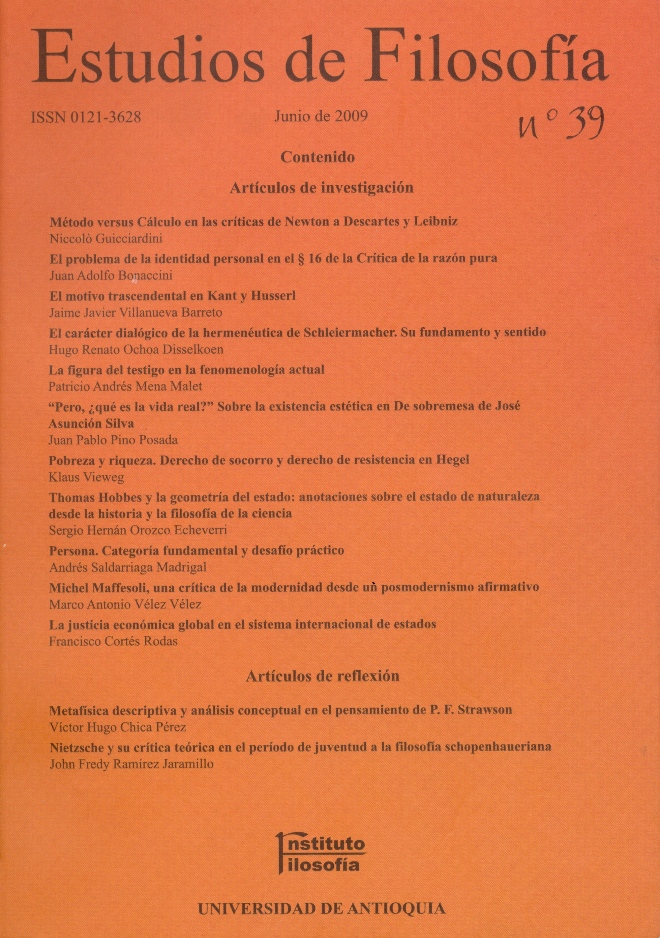Poorness and richness. The right to be aided and the right to resist in Hegel
DOI:
https://doi.org/10.17533/udea.ef.12679Keywords:
Poverty, Recognizance, Civil Society, Philosophy of Law, EthicsAbstract
In the Philosophy of Law, Hegel devotes special attention to one of the most worrying problems of modern societies and states: the unbalanced distribution of richness and its consequent chain of social inequalities and unjustness. In his analysis, Hegel stresses the idea that the conformation of a just civil society and a rational state or state of law, depends entirely on the Recognizance, on the part of these spheres, of the Rights of all the individuals who shall enjoy with dignity material possessions, that will enable them not only the assurance of the material conditions of existence, but also the participation and enjoyment of material and spiritual goods that sustain and give dynamics to “life in common”. According to Hegel's diagnosis, such a Recognizance has, certainly, its point of departure in the realms of Abstract Law and stretches into the realm of Morality, in which realms the individual is recognized as a person and as a moral being, but it is only in the superior realm of Ethics where the Recognizance of all the rights that guarantee an honorable life, acquires universal validity and need, since it is this said sphere, concretely in the sphere of the state, where the said Recognizance can take a hold in the different legal and juridical stances that conform it. Such is the path through which the Political Philosophy of Hegel tries to offer a solution to a problem that, such as the one pointed out, is still a threat to societies at present and questions the selfsame structures of power. Independently of the viability of the offered solution, the Political Philosophy of Hegel begs for a pertinent and unquestionable actuality.
Downloads
References
HEGEL, G. W. F.Naturrecht und Staatswissenschaft nach der Vorlesungsnachschrift von C. G. Homeyer, in: “Ilting”, volumen. 1, pág. 263.
HEGEL, G. W. F.. Nachschrift Griesheim, in: “Ilting”. volumen. 4, pág. 293.
HEGEL, G. W. F.. Philosophie des Rechts: Die Vorlesung, in: “Einer Nachschrift”. Editado por Dieter Henrich. Frankfurt a. M. 1983
HEGEL, G. W. F. Philosophie des Rechts: Die Vorlesung in einer Nachschrift. Ed. Dieter Henrich. Frankfurt a. M. 1983.
HEGEL, G. W. F. Philosophie des Rechts. Nach der Vorlesungsnachschrift v. H. G. Hotho, in: Ilting. Vol. 3, págs. 398-400.
HEGEL, G. W. F. Die Philosophie des Rechts: Vorlesung von 1821/22. Hrsg. v. Hansgeorg Hoppe. Frankfurt a. M. 2005.
HONNETH, Axel. Leiden an Unbestimmheit. Eine Reaktualisierung der Hegelschen Rechtsphilosophie. Reclam, Stuttgart, 2001.
QUANTE, Michael. Hegels Begriff der Handlung. Stuttgart, Fromann- Holzboog, 1993.
Downloads
Published
How to Cite
Issue
Section
Categories
License
Copyright (c) 2009 Klaus Vieweg

This work is licensed under a Creative Commons Attribution-NonCommercial-ShareAlike 4.0 International License.
Authors who publish with this journal agree to the following terms:
1. The Author retains copyright in the Work, where the term "Work" shall include all digital objects that may result in subsequent electronic publication or distribution.
2. Upon acceptance of the Work, the author shall grant to the Publisher the right of first publication of the Work.
3. The Author shall grant to the Publisher a nonexclusive perpetual right and license to publish, archive, and make accessible the Work in whole or in part in all forms of media now or hereafter known under a Creative Commons Attribution-NoCommercia-ShareAlike (CC BY-NC-SA 4.0), or its equivalent, which, for the avoidance of doubt, allows others to copy, distribute, and transmit the Work under the following conditions: (a) Attribution: Other users must attribute the Work in the manner specified by the author as indicated on the journal Web site;(b) Noncommercial: Other users (including Publisher) may not use this Work for commercial purposes;
4. The Author is able to enter into separate, additional contractual arrangements for the nonexclusive distribution of the journal's published version of the Work (e.g., post it to an institutional repository or publish it in a book), as long as there is provided in the document an acknowledgement of its initial publication in this journal;
5. Authors are permitted, and Estudios de Filosofía promotes, to post online the preprint manuscript of the Work in institutional repositories or on their Websites prior to and during the submission process, as it can lead to productive exchanges, as well as earlier and greater citation of published work (see The Effect of Open Access). Any such posting made before acceptance and publication of the Work is expected be updated upon publication to include a reference to the Estudios de Filosofía's assigned URL to the Article and its final published version in Estudios de Filosofía.















